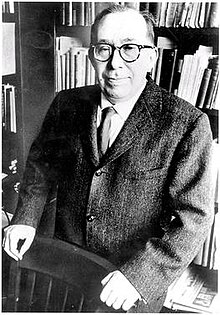Straussian
| Leo Strauss | |
|---|---|

Leo Strauss
|
|
| Born | September 20, 1899 Kirchhain, Prussia, Germany |
| Died | October 18, 1973 (aged 74) Annapolis, Maryland, U.S. |
| Alma mater | University of Hamburg |
| Era | 20th-century philosophy |
| Region | Western Philosophy |
| School |
|
|
Main interests
|
|
|
Notable ideas
|
Politics and philosophy as necessarily intertwined, the unresolvable tension between Reason and Revelation, esoteric and exoteric writing. |
Leo Strauss (/straʊs/;German: [ʃtraʊs]; September 20, 1899 – October 18, 1973) was a German-American political philosopher and classicist who specialized in classical political philosophy. He was born in Germany to Jewish parents and later emigrated from Germany to the United States. He spent most of his career as a professor of political science at the University of Chicago, where he taught several generations of students and published fifteen books.
Originally trained in the neo-Kantian tradition with Ernst Cassirer and immersed in the work of the phenomenologists Edmund Husserl and Martin Heidegger, Strauss later focused his research on the Greek texts of Plato and Aristotle, retracing their interpretation through medieval Islamic and Jewish philosophy and encouraging the application of those ideas to contemporary political theory.
Leo Strauss was born in the small town of Kirchhain in Hessen-Nassau, a province of the Kingdom of Prussia (part of the German Empire), on September 20, 1899, to Hugo Strauss and Jennie Strauss, née David. According to Allan Bloom's 1974 obituary in Political Theory, Strauss "was raised as an Orthodox Jew," but the family does not appear to have completely embraced Orthodox practice. Strauss himself noted that he came from a "conservative, even orthodox Jewish home," but one which knew little about Judaism except strict adherence to ceremonial laws. His father and uncle operated a farm supply and livestock business that they inherited from their father, Meyer (1835–1919), a leading member of the local Jewish community.
...
Wikipedia
